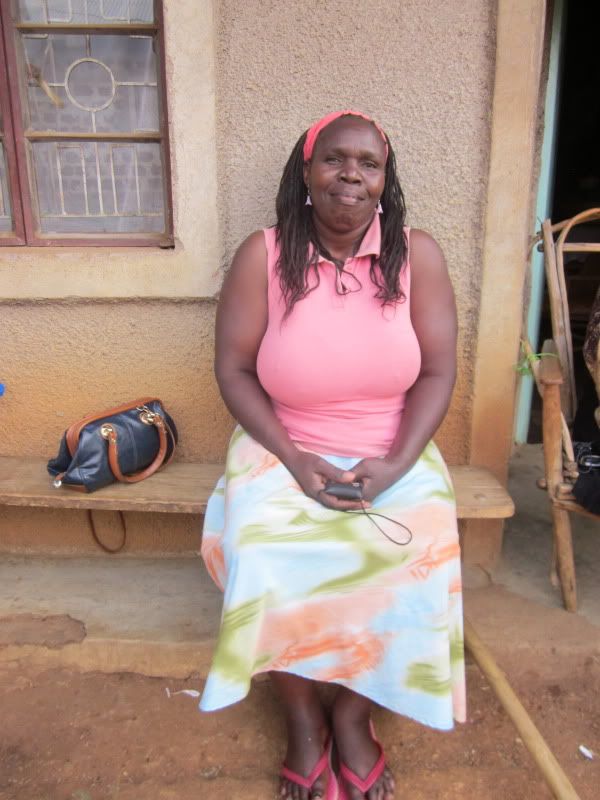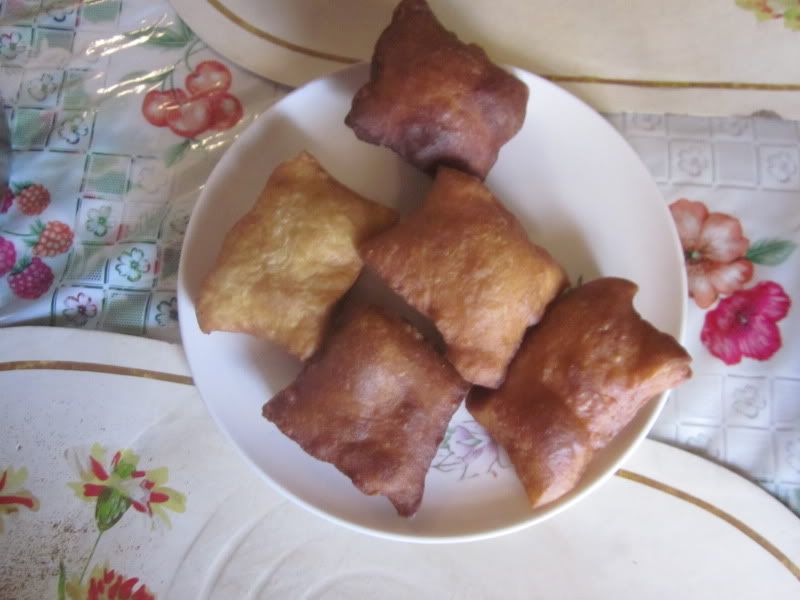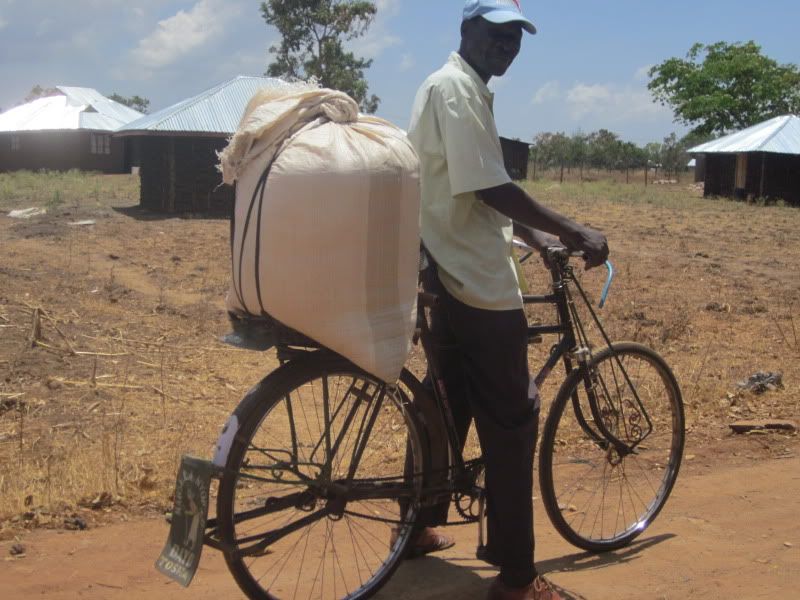
Selene
After Selene told me her name, she said:
Odero is my father. I'm not yet married. Not because I am young, but because they overlooked unto me because of my disability. They thought I'll be nothing to them. I've got a lot of burdens so if I join someone, they'll do me everything. They thought like so. But I can do everything. I can dig. It's only walking a longer distance I cannot do. But other things I can do. Even right now I stay alone. I stay in this small cabin right here. I'm taking care of myself. I have one son, 21 years old. The son is seeking for employment in Nairobi now.
So as for myself, I was trained as a tailor. I'm a tailor by profession. I have a machine inside here. I was trained by the Rehabilitation Center for the Disabled in Kisii.
Amy told me that Selene was the secretary of an organization of people with disabilities. I asked about it. She replied:
My people - we have a number of people. We now operate, we scope the whole Bondo District. It is Bondo District Disabled Group. We cater for all types of disabilities. We have cripples, we have physically challenged, we have deafs, we have blinds, and many others. And even we have the associate members because there are times when we cannot work alone. We need to get some people who can push for us those who cannot drive their own wheelchairs. They are supposed to be supported. So we have the associate members. We also have parents to those with disabilities. We have some children who also have disabilities so we come together with their parents.
We're about 74 people. We registered in the year 2005. We decided to come together, we made the elections, we found our chairperson, secretary, treasurer, and that.
Then I asked what the group actually does. The answer was varied and a bit muddled, but here's what I could make out. She said, "We trained people, we were going around, training people to take care of themselves because of their disabilities." Then she mentioned income generating activities and said "We're going to buy dairy goats." The plan is to distribute them to each member as the goats multiply: "It gives birth, I give my neighbor." Then she said "We bought chairs and tents, we use them for hiring purposes." This made a lot more sense once Amy explained that the chairs and tents are rented out for funerals - and this area, with an AIDS rate of about 20% has a lot of funerals. "Every weekend. Every weekend, like here, we bury people on weekends. There are 100 chairs. We take them out, we are assured of 100 shillings."
Then I asked about her broiler project. She's a project manager for a small group project, and they are keeping the chickens at the headquarters for this small group.
We used to buy them at the Kenchic Kisumu when they are 1 day old. We bring them here, we keep them for 6 six weeks, then we sell them and they are ready for slaughtering. Six weeks only! I know you are - even I have the photograph, I can show you. So I've done that one twice. [I assured her I believed it was true and she went on] This time around, I stopped a bit because of the climate. They are so delicate, you cannot bring them when the weather's like this. They can acquire many diseases.
I started with 150 broilers, so... the mortality rate was a bit high because I was a bit new in the field. I lost about 10. I remained with 140. the 140, I sold them.
Kenyans are masters of the dramatic pause, especially when they are saying anything that has to do with math. Started with 150, lost 10, I remained with [pause] 140.
At this point it becomes a bit hard to hear every single word she says on my recording, but she said when she went to get more chicks, there was a food crisis and the feed for the birds is expensive, so that influenced her decisions about the broiler project. I asked what she feeds them.
For the first week, we give them broiler chick mash plus the crumbs. From 3 to the last week, we give them finisher mash. We give them starter at the beginning and finisher at the end. Starter at the beginning, you mixed with crumbs. And the finisher at the end, you mixed with the - what do you call that one - so one sack 70kg is 4500 [$54]. It's very expensive. And when they are still young, the 150 broilers can consume 2 sacks plus the crumbs. And from three weeks to the last weeks, they eat - they can consume two sacks in a week. Because they eat day and night, day and night.
All in all, by my math, that's 10 sacks of feed, or $540. I asked what the chicks cost.
It is 70 shillings and 50 cents at the Kenchic, and then when they are ready here, I sell them at 400 shillings per chick. And they really grow faster. Six weeks, you can't imagine! They are big and healthy!
So she paid Sh10,575 ($126.90) for the 150 chicks and sold 140 chickens for Sh56,000 ($672). By my math, the chicks plus the feed cost her $666.90. That's not much of a profit margin, unless I misunderstood the number of feed sacks she meant. I might be off by 2 sacks of feed, which would give her an extra $108 in profit.
We asked about the breed. She said:
You can't even know, they are all mixed up. You can't even know this one is a hen or a cock. They are all white. They really don't even have that behavior of chasing each other. They are just like that. You can't even actually see if this one is a cock or a hen! And they are very sweet. Nowadays if you go to conferences, they are the things which are cooked there. They are very nice. They do them the deep fried. They are not cooked with water, they are fried with oil like mandazis.

Mandazis
I asked if she tasted them. She replied: "Yes, yes, even those ones of mine. I'm the first person who got them. I have to buy."
I asked how they tasted. She said, "They taste very nice. I was advised not to cook, I was told just to fry. I fried. Very very very nice. Very sweet. Even my neighbors tasted it. Ask them how delicious they were."
Then Amy asked why they must be fried. She said, "They have a lot of fats. They are very soft. You can overcook them. If you are supposed to cook, then you have to roast fast for the oil to drip out so that they can - so that you can cook for only 30 minutes, not more than 30 minutes. It will be too soft and sweet."
I asked if these were her top two ways to earn a living - tailoring and poultry. She replied, "The tailoring is my own business. I like it because it pays for my son. The poultry I am doing for the benefit of my group members."
So I asked what the money was used for within the group. It's basically micro-lending. "We lend you, you bring back the interest on top."
I asked her what people use loans for. The group got a 400,000 grant and 100,000 loan. They put that together. She told me they offer 3 month loans with 5% interest. People would take as much money as they thought they could pay back. The conversation got interesting here. I asked if people would, for example, take the loan, buy a sewing machine, do tailoring work, and pay back the loan with interest that way. Selene said "We have never thought of it that way" but she liked the idea!
They have disbursed the money to every member. Selene took 10,000. She was able to repay it. "I used it in another project. I had a friend who was brewing the busaa. Busaa is a local beer that is brewed like a porridge." She had someone brewing it for her a ways away from where she lives, because she didn't want her parents to find out. "They are Christians," she explained, "So if they hear of the busaa, they would not accept me. So I decided to go and buy all the ingredients for that person. So the ingredients, I bought, and the business was not bad."
The person who made the beer sold it and they split the money. She made a profit of 5000 shillings ($60). But, she said, "I decided to stop that business because I was afraid. It was a little bit illegal business." She didn't have a license for it. "It was a good business" she said, because they sold all the busaa in two weeks and made all the money back.
At this point, we all ended up laughing as we talked about what a good business this was. There were some drunks in the area that Amy and I had seen over the last few days, so we speculated that Selene would have a loyal customer base.
I asked if she might consider taking the loan money to buy a license so she could keep selling busaa. She hadn't thought of that but loved the idea. At the end of our short chat, she told me I should come back because I had lots of good ideas. I hadn't even intended to give her ideas - I was just trying to probe to find out what they were doing with their money. But I guess I gave her some ideas!

A man carrying ingredients for busaa or changaa (a local distilled spirit) on a bike
No comments:
Post a Comment